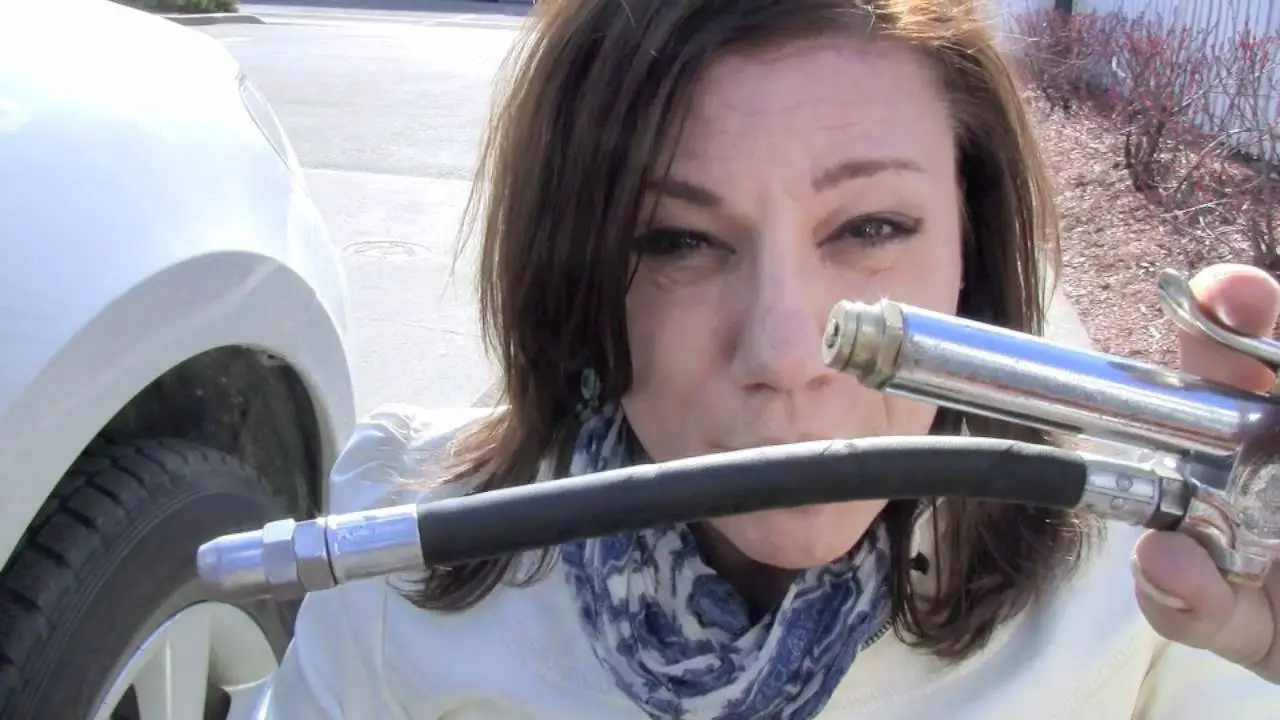Gas station air pumps can sometimes cause tire deflation. It is important to understand the reasons behind this issue and how to prevent it.
Gas station air pumps are a convenient resource for drivers to maintain proper tire pressure. However, there are instances when using an air pump may result in tire deflation. This can be frustrating and lead to potential damage or safety risks.
We will explore the common causes of gas station air pumps deflating tires and provide practical tips to avoid this problem. By understanding the underlying issues and taking preventative measures, you can ensure your tires stay properly inflated and avoid unnecessary inconveniences on the road.

Understanding The Problem
When facing a deflating tire due to a gas station air pump, it’s crucial to understand the underlying problem. Check for leaks, faulty valve stems, or damaged rims to address the issue effectively. Regular maintenance and prompt action can prevent further complications and ensure road safety.
Understanding the Problem Gas station air pumps are a convenient and accessible solution for maintaining the correct tire pressure. However, there are instances when using these air pumps can result in tire deflation. It is crucial to understand the reasons behind this problem and the potential damage it can cause to your tires.Causes Of Tire Deflation At Gas Stations
One of the primary causes of tire deflation at gas stations is a faulty or damaged air pump nozzle. Over time, these nozzles can wear out or become damaged, leading to air leaks while inflating or deflating tires. It’s important to inspect the nozzle before using the air pump to avoid this issue. Another common cause of tire deflation is improper handling of the air pump. If the nozzle is not properly inserted or if excessive force is applied during inflation or deflation, it can lead to air leakage and cause the tire to deflate. Taking a moment to ensure the nozzle is securely attached can prevent this problem.Potential Damage To Tires
In addition to the inconvenience of having a deflated tire at a gas station, there are potential damages that can occur. Driving on an underinflated tire can cause uneven wear on the tread, reducing the overall lifespan of the tire. This can lead to frequent replacements and increased expenses. Furthermore, driving on a deflated tire can impact your vehicle’s fuel efficiency. It requires more energy to move a vehicle with underinflated tires, resulting in increased fuel consumption. Maintaining proper tire pressure not only extends the life of the tire but also ensures optimal fuel efficiency and saves you money in the long run. Lastly, prolonged driving on underinflated tires can lead to overheating, which can increase the risk of tire blowouts. This hazardous situation can cause loss of control of the vehicle and potentially lead to accidents. Regularly checking your tire pressure and addressing any deflation issues promptly is crucial for your safety on the road. In conclusion, understanding the causes of tire deflation at gas stations and the potential damages that can occur is essential for maintaining the longevity and safety of your tires. By being vigilant and practicing proper tire maintenance, you can avoid this problem and ensure a smoother and more enjoyable driving experience.Preventive Measures At Gas Stations
When it comes to maintaining the safety and longevity of your vehicle, preventive measures are essential, especially when it comes to something as important as your tires. Gas stations provide a convenient location to inflate your tires using their air pumps. However, it’s crucial to take certain preventive measures to ensure a smooth and safe experience. In this article, we will discuss a few preventive measures you should consider while using gas station air pumps to deflate and inflate your tires.
Selecting The Right Air Pump
Choosing the right air pump is the first step towards ensuring the proper inflation of your tires. Not all gas station air pumps are created equal, and using an unsuitable pump can lead to inaccurate readings or even damage to your tires. When selecting an air pump, keep the following points in mind:
- Look for air pumps with digital displays for precise readings.
- Ensure the pump has an automatic shut-off feature to prevent over-inflation.
- Check if the pump offers preset pressure levels for different types of tires.
By selecting the right air pump, you can minimize the risk of over-inflation or under-inflation, which can adversely affect your tire performance and vehicle safety.
Checking Air Pressure Before Inflating
Before inflating your tires, it’s crucial to check their current air pressure. This step helps you identify if your tires are under-inflated or over-inflated, allowing you to adjust the air pressure accordingly. Here are some simple steps to check the air pressure before inflating your tires:
- Locate the recommended tire pressure for your vehicle. You can find this information usually on a sticker inside the driver’s side door or in the vehicle’s manual.
- Remove the valve cap from the tire you wish to inflate.
- Place the air pressure gauge onto the valve stem firmly and press down to get an accurate reading.
- Compare the reading on the gauge with the recommended tire pressure. If the reading is higher or lower, you will need to adjust the air pressure accordingly.
By checking the air pressure before inflating, you can ensure that your tires are properly inflated to the recommended levels, optimizing fuel efficiency, tire performance, and overall safety.
Maintenance Tips For Tire Health
Proper maintenance of your tires is essential for your car’s safety and performance. By following these tire maintenance tips, you can ensure the longevity and efficiency of your vehicle’s tires.
Regularly Inspecting Tire Pressure
- Check tire pressure monthly for optimal performance.
- Use a reliable pressure gauge for accurate readings.
- Ensure tires are inflated to the manufacturer’s recommended PSI.
Avoiding Overinflation
- Overinflated tires can lead to uneven wear and reduced traction.
- Refer to your vehicle manual for the correct tire pressure.
- Do not exceed the maximum PSI indicated on the tire sidewall.
If you notice your tires constantly deflating after using a gas station air pump, it might be indicative of a larger issue. It’s crucial to address this promptly to prevent any safety hazards on the road.

Credit: newatlas.com
Emergency Solutions On The Road
When you find your tire deflating at a gas station air pump, it can be a stressful situation. However, there are a few emergency solutions that can help you deal with this unexpected occurrence and get back on the road quickly.
Carrying A Portable Tire Inflator
If you’re a proactive driver, carrying a portable tire inflator can be a real lifesaver in situations like a deflating tire at a gas station. These compact and lightweight tools allow you to quickly and efficiently inflate your tires, getting you back on the road in no time.
Portable tire inflators are easy to use and often come with built-in pressure gauges to ensure that your tire reaches the correct inflation level. Keeping one of these handy devices in your car can provide peace of mind, knowing that you have a solution for unexpected deflation situations.
Knowing How To Change A Tire
Knowing how to change a tire is an essential skill for every driver. While it may not directly address a deflating tire at a gas station, this knowledge can be invaluable in helping you get back on the road after a tire issue.
Ensure you have the necessary tools in your vehicle, such as a spare tire, jack, and lug wrench. Understanding the steps involved in changing a tire can save you time and hassle, allowing you to handle the situation with confidence and efficiency.
Community Awareness And Education
Learn about the importance of community awareness and education regarding gas station air pump maintenance to prevent tire deflation. Stay informed to protect your vehicle and ensure safe travels.
Community Awareness and Education Gas station air pump deflating tire incidents can have serious consequences if left unaddressed. Community awareness and education play a crucial role in preventing such mishaps. It is essential to educate drivers about proper tire inflation and encourage them to report malfunctioning air pumps promptly. By spreading awareness and taking proactive measures, we can ensure the safety of everyone on the road.Educating Others On Proper Tire Inflation
Proper tire inflation is vital to ensure safe driving and prevent unnecessary wear and tear on vehicles. Educating others on the importance of maintaining the correct tire pressure can significantly reduce the risk of accidents and breakdowns. It’s imperative to highlight the significance of regular tire checks and the use of functional air pumps at gas stations. Distributing informational flyers or organizing workshops can effectively educate the community on this essential aspect of vehicle maintenance.Reporting Malfunctioning Air Pumps
Reporting malfunctioning air pumps is crucial to preventing gas station air pump deflating tire incidents. Encouraging individuals to promptly report any issues with the air pumps they encounter can help prevent potential accidents and inconvenience. Providing clear instructions on how to report such malfunctions to the gas station management or relevant authorities can empower the community to take proactive steps in ensuring the safety and functionality of these essential facilities. By focusing on community awareness and education, we can work together to minimize the risks associated with gas station air pump deflating tire incidents. Empowering individuals with the knowledge to maintain proper tire pressure and report malfunctioning air pumps is key to creating a safer driving environment for everyone.
Credit: www.reddit.com

Credit: www.way.com
Frequently Asked Questions For Gas Station Air Pump Deflating Tire
Why Is My Tire Deflating After Using A Gas Station Air Pump?
After using a gas station air pump, your tire may deflate due to a faulty valve stem, improper sealing, or a puncture in the tire. It’s essential to check for any visible damages on the tire and ensure the valve stem is securely tightened.
How To Prevent Tire Deflation After Using A Gas Station Air Pump?
To prevent tire deflation after using a gas station air pump, ensure the valve stem is properly sealed, check for any punctures or damages on the tire, and monitor the tire pressure regularly. Properly inflating the tire to the recommended PSI can also prevent deflation.
Can Overinflating Tire Using A Gas Station Air Pump Cause Deflation?
Yes, overinflating the tire using a gas station air pump can cause deflation. It puts extra pressure on the tire, increasing the risk of a blowout or potential damage. Always inflate the tire following the manufacturer’s recommended PSI to avoid overinflating and potential deflation issues.
Conclusion
Ensuring your tires are properly inflated is crucial for safety and performance. Gas station air pumps can sometimes deflate tires due to various factors. Regularly check your tire pressure to avoid unexpected issues and maintain optimal driving conditions. Remember, a well-inflated tire is a safe tire.